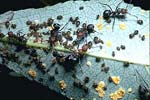Warning: These ants have strong biting jaws, they also smear the bitten area with formic acid which increases the degree of irritation they cause.

- Food Honeydew from aphids, nectar from flowers, and other insects.
- Life Cycle Nests are often constructed close to small trees and shrubs. Entranceways are littered with pine needles, leaf fragments, and bits of stems. Queen tends 1st brood, then female workers care for eggs and young, feeding queen regurgitated food.
- Habitat Wooded slopes at high elevations.
- Range Utah and Nevada to mountains of California, north to British Columbia and Alberta.
- Discussion Workers often stay near aphids or transport them to more convenient sites, where honeydew can be collected repeatedly. The Allegheny Mound Ant (F. exsectoides), same size, is rusty red on its head and thorax, blackish brown on the legs and abdomen. It occurs throughout the eastern United States and adjacent areas of Canada, west to Wisconsin, Iowa, Kansas, Colorado, and New Mexico.
© Copyright Apestcontrol.com 2025



